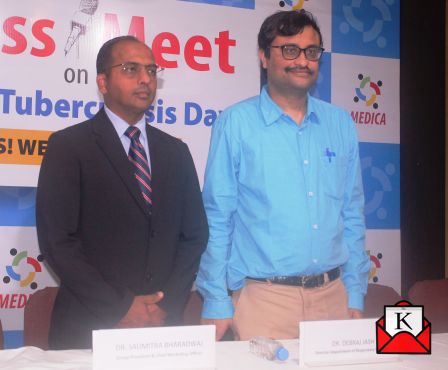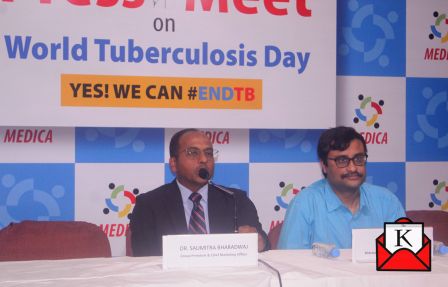Medica Leads TB Awareness By Unveiling New Strategies To Combat The Disease


The Medica Group of Hospitals held a news conference to commemorate World Tuberculosis Day. In terms of both cases and deaths, India has the highest global burden of tuberculosis (TB), which presents a serious public health concern. In the world, 28% of tuberculosis cases occur in India. Under the theme “Yes! We can end TB,” the World Health Organisation (WHO) organized the event to increase public awareness of tuberculosis.
Dr. Debraj Jash, Director, Department of Respiratory Medicine, Medica Superspecialty Hospital, and Dr. Saumitra Bharadwaj, Group President, and Chief Marketing Officer discussed important information and facts regarding tuberculosis. They dispelled myths about the illness and underlined the value of early detection and timely treatment.
Although there is still a big worldwide health problem with tuberculosis (TB), concentrated efforts are going on to make India TB-free by 2030. Even though the number of tuberculosis cases decreased slightly from 22.4 lakhs in 2022 to 22.3 lakhs in 2023, there is still much work to be done in the fight against this infectious disease. According to official data, many people have not registered for the Nikshay Poshan Yojana, a crucial government financial program, and some have not yet taken advantage of its benefits. To monitor the disease and carry out efficient public health initiatives, tuberculosis (TB) cases must be reported to government health centers. This guarantees that those who are TB-affected receive the proper care and that actions are quickly implemented to stop the spread of the disease.
Tuberculosis (TB) diagnosis and treatment have changed dramatically as a result of medical technology. More accurate diagnosis has been made possible by procedures like bronchoscopy and biopsy, especially when lymph nodes are involved. This has improved patient outcomes and allowed for prompt therapies. Drug-sensitive and drug-resistant forms of tuberculosis are treated equally. Modern laboratory equipment and capabilities have drastically shortened the turnaround time for diagnostic reports from 40 days to just 2-3 days, allowing for a prompt start of therapy. Treatment of tuberculosis (TB), particularly drug-resistant forms, has advanced significantly. With almost 100% success rates, new medications like Bedaquiline and Delamanid have shortened treatment durations from 24 months (about 2 years) to just 9 months. Treatment accessibility and compliance are further enhanced by the availability of all oral drugs.
With growing awareness, TB can be curbed at the initial stages and patients can get well quickly.
Priyanka Dutta
